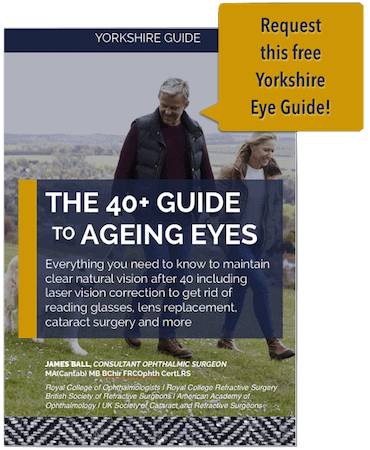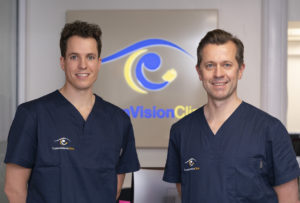What is lens replacement?
Lens replacement is the surgical procedure involving replacing your natural lens (inside your eye) with an artificial lens. The procedure can be used to fix severe refractive errors or ageing eyes, whether they are afflicted by presbyopia or cataract.
What eye conditions does lens replacement treat?
- Severe short-sightedness
- Severe long-sightedness
- Severe astigmatism
- Presbyopia
- Cataract
Who is suitable for lens replacement?
Generally, anyone with a crystalline lens (everyone) that suffers from a refractive error or ageing eyes is suitable for the lens replacement procedure. However, no surgery is without risk, and because lens replacement is an intraocular (inside the eye) operation, most surgeons only treat those patients who are unsuitable for laser eye surgery or need cataract surgery.
Ideal candidates for lens replacement depend on circumstance, lifestyle, glasses prescription, corneal thickness and pupil size.
How successful is lens replacement?
James Ball discusses the success of lens replacement surgery.
How does lens replacement work?
The lens replacement technique is one of the most resilient eye surgery processes still in existence. There have been several game-changing innovations (e.g. phacoemulsification and multi-focal lenses) but the process has generally remained the same since we first started removing cataract from the eyes in the mid 1700s.
The lens replacement procedure is painless under local or topical anaesthetic. On the day of surgery (in a hospital) we will dilate your pupils with eye drops. We will then clean the area around your eye.
We use micro-incision phacoemulsification to perform cataract surgery. This utilises high frequency ultrasound delivered by a tiny probe introduced into the eye through a two millimetre incision. The ultrasound probe liquefies and aspirates the cataract. The ‘phaco’ device emits ultrasound waves that break up the hard lens. We then suction the remains of the hard lens with the same probe.
Femtosecond lasers can now be used to perform certain steps in the cataract surgery. The only step of any relevance is the creation of the circular opening in the membrane which contains the cataract lens material. The femtosecond laser creates a perfect circle. However, this hasn’t resulted in improved outcomes because when the membrane heals after surgery the opening loses its perfectly circular shape. Also, the femtosecond laser causes more redness, dryness and inflammation after cataract surgery so we no longer use it. We do continue to have access to the Lensar ™ femtosecond cataract laser system at Optegra Yorkshire and the Victus ™ femtosecond cataract laser system at St James’s Hospital in Leeds.
Surgical guidance systems have proved useful in assisting our surgeon to make a perfectly circular capsule open to rival that made by the laser. The surgery is more comfortable for the patient and results in less post-operative redness and inflammation.
This year we will begin using the Zepto ™ device to create a perfectly circular capsule opening.
Once we’ve removed the lens, we’ll replace it with an artificial lens implant. We fold the implant and insert it through the tiny incision. The lens then unfolds in the eye exactly where it should. We can rotate the lens implant to a specific position. This is vital for the astigmatism-correcting toric intra-ocular lens implants (IOL’s)
You can typically go home the same day and look forward to a rapid and pain-free recovery. Your vision might improve within 48-72 hours and you can return to work or your usual leisure activities within a day or two.
Advantages and disadvantages of lens replacement compared to laser eye surgery
Compared to laser eye surgery for short-sightedness, long-sightedness and astigmatism, lens replacement
- Can be used with severe prescriptions
- Is more invasive than laser eye surgery
- Has a relatively slower recovery
- Has a greater risk
Compared to PRESBYOND ™ blended vision laser eye surgery to correct presbyopia, lens replacement
- Is a permanent solution that avoids cataract in the future
- Has slightly less visual acuity
- Is more invasive
- Has a relatively slower recovery
- Has a greater risk
Results at a glance
My eyesight following the operation is brilliant and better than I thought possible, and this is all down to your excellent surgeon Mr James Ball and not to forget all the very dedicated people around him who make these operations possible.
Keith Garlick
Two of the best decisions I ever made in my life were firstly to have lens exchange and secondly to have Mr James Ball carry out my operation.
Patricia Walton
Within minutes I could tell there was a difference. But now, only a couple of months later, my sight is better than it was seven years ago! I can even read the really tiny print on the car sales ads! If you want that confidence you probably felt when you were younger, this is the ideal solution. Thanks to the treatment, I feel rejuvenated, independent and much younger!
John Hazelgreave
Many thanks for all your care and kindness. To me it appears a miracle that I can see so well. I feel very grateful. It is impossible to fully express my thanks.
Grace C.
May I offer grateful thanks for your expertise in operating on my eyes. It was intimated to me that you were the best, and from the results I am now enjoying, I am convinced that this is correct.
Jean D.
You are truly innovative. Thank you very much for curing the problems I have been having with my reading and near vision.
Sala M.
My work was becoming almost impossible. I had refractive lens exchange to both eyes with multifocal lens implants last July. I can now see better than 20/20 for distance and can read the tiniest print in newspapers - all without glasses! I have started reading for pleasure again, and I feel that my performance both at work and on the golf course has improved.
John
Request a callback
Two of the best decisions I ever made in my life were firstly to have lens exchange and secondly to have Mr James Ball carry out my operation.
Our reviews on Trustpilot
Further information about eye conditions
Discover your eye treatment options
Give us a call on: 0345 643 0466
Or request a call back:
More Useful Information





